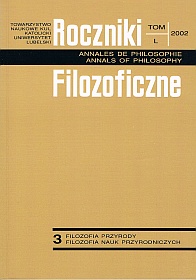Metaphysical Principles of Genesis
Abstract
An analysis of the history of philosophy and science in ancient Greece shows that the mathematical problem was to create natural science. All efforts to make mathematics at the center of which we find static geometric form, a science explaining the principles of things moving, changing, becoming, and disappearing have failed to produce the expected results. The researchers concluded that the visible world is the subject of different views rather than science (see, e.g., Plato, Timajos, 29). Nevertheless, it was correct to think that mathematics was essential to the natural sciences. The Book of Nature was written in the language of mathematics, and this is the motto of New Age physics. Now it would be necessary to show specifically how the language of mathematics can describe changes.
Ancient Greek mathematics was not ready for this task. The Greeks had the choice of either giving up the project of creating a natural science or building it on something else. Aristotle chose the latter. He based physics on metaphysics instead of mathematics and created the first scientific theory of nature that was valid for centuries until it was replaced (and not entirely peacefully) by more scientific mathematical physics. Newton warns: physics rejects metaphysics; it reflects the collision between Aristotle's physics and New Age physics. The question arises whether Aristotle's physics stimulated or hindered the development of natural sciences. The answer to this question should be of interest to Catholic thinkers because of its direct connection with Thomism.
Copyright (c) 2002 Roczniki Filozoficzne

This work is licensed under a Creative Commons Attribution-NonCommercial-NoDerivatives 4.0 International License.





